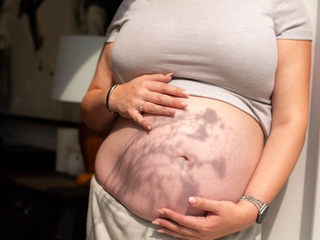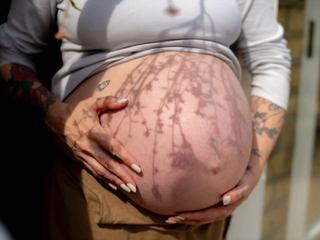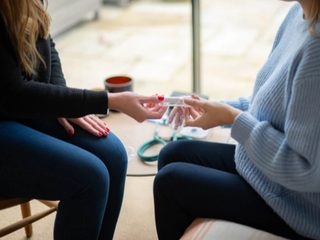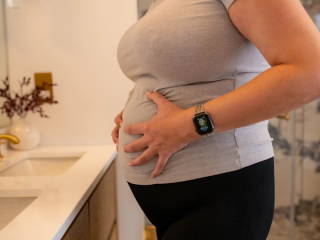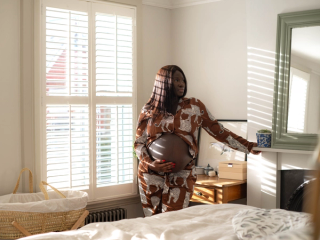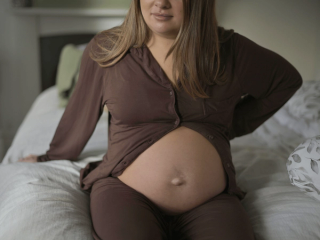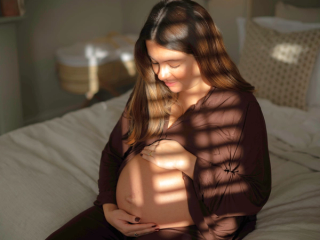
- Home
- Advice Hub
- Pregnancy
- Pregnancy Symptoms & Issues
- Pregnancy Loss & Miscarriages
Pregnancy Loss & Miscarriages
Find out more on coping with pregnancy loss and miscarriages, including emotional care, understanding causes, and connecting with resources for healing.
What is early pregnancy loss?
What is the difference between a miscarriage and early pregnancy loss?
Risk of miscarriage by week
What causes pregnancy loss?
Signs and symptoms of a miscarriage
Treatment for pregnancy loss
What happens after a miscarriage?
How soon can I get pregnant again after pregnancy loss?
FAQs about pregnancy loss
Reviewed by Christine Lane, Midwife and Consultant, on the 24.09.2025
What is early pregnancy loss?
Early pregnancy loss, or miscarriage, is the loss of a pregnancy within the first trimester, or 12 weeks. The term miscarriage is still used in the second trimester up until 23 weeks. From 24 weeks the term changes to ‘stillbirth’.
Early pregnancy loss is sadly relatively common. It is estimated that 1 in 8 known pregnancies end in miscarriage. The figure is higher if you count miscarriages that occur before the pregnancy was known.
What is the difference between a miscarriage and early pregnancy loss?
Miscarriage is divided into two types – early pregnancy loss, which happens in the first 12 weeks, and late pregnancy loss, which covers the period 13-23 weeks. Another medical term you might read is ‘spontaneous abortion’.
Risk of miscarriage by week
The risk of miscarriage reduces week by week. Tommy’s, the pregnancy and baby charity, estimates that 10-20% of pregnancies end in miscarriage in the first 12 weeks (early pregnancy loss). The risk of late miscarriage is much lower, at 3-4% of pregnancies. Tommy’s also estimates that around 1 in 80 pregnancies are ectopic.
What causes pregnancy loss?
Pregnancy loss can occur for a number of reasons; often these will not be known. While things like smoking, drinking and recreational drug taking are associated with a risk of miscarriage, the most common cause of early pregnancy loss is chromosomal abnormalities. Typically, there is absolutely nothing that can be done to prevent a miscarriage from occurring – it really is one of those things that ‘just happen’.
The risk of miscarriage increases with maternal age, i.e. the age of the mother, and is highest in the 45+ age bracket.
Signs and symptoms of a miscarriage
The most common sign of miscarriage is vaginal bleeding, with cramping or pain in your lower abdomen. Light bleeding or spotting is fairly common in early pregnancy but with a miscarriage the bleeding is likely to be heavier and more prolonged. If you have any concerns about bleeding in pregnancy, call your midwife – or, if the bleeding is heavy and you’re in pain, call 111.
Other symptoms to watch out for include a loss of fluid or tissue from the vagina. Some people also report a loss of pregnancy symptoms alerted them to their miscarriage, but as your pregnancy symptoms are likely to ease in the first trimester anyway this is not a conclusive sign.
In the event of an ectopic pregnancy, you will need to see a doctor urgently. Symptoms of an ectopic pregnancy (where the foetus has begun developing in the fallopian tube) include severe tummy pain, vaginal bleeding, pain in your shoulder, vomiting and/or diarrhoea and dizziness.
Treatment for pregnancy loss
Treatment for pregnancy loss will depend on how your miscarriage proceeds. In early pregnancy loss, you often have the option to let the miscarriage proceed without medical intervention. Alternatively, you may need assistance to remove the remains of the baby and pregnancy tissue from your womb – this can be instigated with medicine, or completed surgically, depending on the advice of your doctor. With late miscarriages, your doctor may need to help you give birth to the baby and placenta vaginally.
What happens after a miscarriage?
After a miscarriage, you should talk to your doctor or midwife about next steps. They will be able to advise on any further treatment required, and how long you should wait before trying again. They should also offer you support, either by pointing you towards a specialist support service, or referring you for counselling, if you want it.
Physically, your recovery will depend on the stage of pregnancy you had reached and how your miscarriage progressed. There isn’t an exact timetable for when you should start feeling better. If the miscarriage happened without medical intervention, it might take longer to complete. You should also watch for signs of an incomplete miscarriage (such as prolonged bleeding and fever), which might lead to infection.
There is no right or wrong way to feel about a miscarriage, and the length of time for which you carried the baby has no bearing on how upset you might feel. Your feelings are valid, and you have the right to ask for the support you need. If you don’t feel supported by your healthcare provider, try contacting one of the charitable organisations set up for exactly this purpose, such as Tommy’s or Saying Goodbye.
How soon can I get pregnant again after pregnancy loss?
Getting pregnant again after pregnancy loss can be a time of extreme anxiety and high emotions. It’s a good idea to give yourself time to process your loss.
In terms of fertility, it is possible to get pregnant again straight after a miscarriage. Once the miscarriage is complete, your body should resume its normal menstrual cycle – though it is often advised to wait at least one period after your miscarriage to make sure this is the case.
Pregnancy loss is sadly common and yet can feel very isolating. Your baby may have been very early in its gestation, but they were still yours and you may feel the loss very deeply. Though it can be hard to talk about, talking is so important – to your partner, your friends and your family – while you work through your grief. You can also reach out to organisations such as those listed below for more support.
FAQs about pregnancy loss
As soon as you start trying for a baby, you start imagining life as a family. Pregnancy loss can feel like it wipes that future away, which is why it can be so hard to get back to normal again after the loss of a baby.
The first thing to do is acknowledge that these feelings are valid and normal. You have every right to feel that way. The next thing to do is find someone to talk to. That might be your partner, but it might not be – we don’t all react the same way to miscarriage or to grief. It might be that your friends and family can support you – and you will probably find that once you start talking to them you will discover that people you know have been through pregnancy loss. It’s good to talk to people who can relate to your experiences. Alternatively, talk to a professional – either from a baby loss charity or a counselling service – who will help you find ways to process your grief and move forward.
Most people who have a miscarriage go on to have healthy pregnancies. Your own circumstances might depend on the nature of your pregnancy loss. You should be given the opportunity to sit down with your healthcare professional and discuss your chances of getting pregnant again.
Yes, it is likely you will still test positive during and even after a miscarriage. This is because pregnancy tests detect the presence of a hormone called hCG, which will not disappear straight away when you lose your baby. Your hCG levels may remain elevated for up to a month after your miscarriage, so if you do decide to try to get pregnant again straight away this might confuse things. Speak to your healthcare professional for advice.
Rest until you feel better. You may feel physically well enough to get up and go back to work quite quickly after your miscarriage, but there is no rush to get back to your normal routine. The blood loss that occurs with a miscarriage can make you feel really wiped out, so it is a good idea to keep activity levels down while you recover. However, some light exercise in the fresh air will help lift your mood and keep your body moving.
There is some research that links stress with miscarriage, but this is not the day-to-day stress you might encounter when you have, for example, a bad day at work. If you’re worried about your stress levels, talk to your healthcare professional who can help you find ways to manage your stress, e.g. through therapy, light exercise, or meditation.

